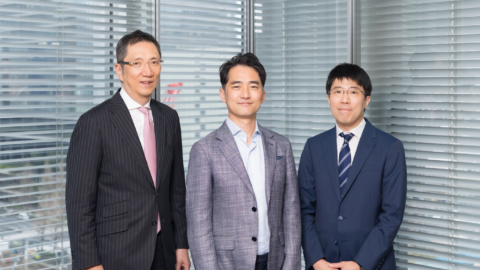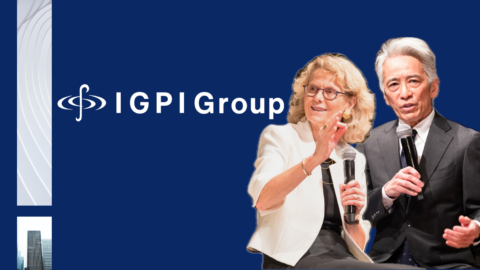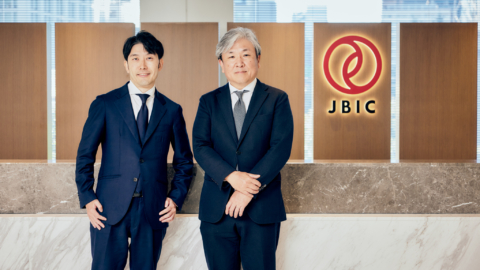
The History IGPI will Create in the Future
In the first half of this talk, we looked back on the activities of the Industrial Revitalization Corporation of Japan (IRCJ) breaking down the problematic Showa model, and how the members eventually came together to found IGPI. Now that many new members have joined in the current Reiwa era, what will the IGPI Group aim to achieve in the future? Keita Nishiyama, IGPI’s Senior Executive Fellow, and Kazuhiko Toyama, Chairman of IGPI Group, will discuss the future of IGPI.
Three activities that pave the way for a new era
Keita Nishiyama In the past, we had been working on the transition from the Showa model, but we see ecosystems continue to evolve across countries worldwide. In addition, given the emergence of AI, we are witnessing yet further change in the nature of industries and governance of the world. What are the activities that lie ahead for the IGPI Group going forward?
Kazuhiko Toyama The activities of the IGPI are so diverse that people both internally and externally tell me that they do not understand what we do. Based on our purpose statement, “Pioneering a new era of management”, we have three pillars of business activities. The first is consulting, with the objective of transforming companies. The second is incubation, where we engage in creating new startups and industries. The third is acquiring companies and managing them. What all three pillars have in common is that we try to renew the outdated paradigms in each respective industry, business and function. These three pillars make up a methodology that could stimulate a historic shift in the world of management and economy, so we intend to continue working on them.

Keita Nishiyama It’s been almost three years since I became Senior Executive Fellow, but what I find consistent in IGPI is its efforts to create a new ecosystem as well as nurture the people who supports it. If I were to think of a catchphrase to describe the current transformations, I would put it as “from Optimization to Evolution”. The reason why I believe evolution will become the mainstream is because the world is increasingly growing complex, and in order to combat that, the world must be constantly reconfigurable.
For example, Mr. Shinichiro Okada of Nanki-Shirahama Airport says that he wants to make “an airport that transcends being just an airport”, but this is precisely what we mean by evolution. Michinori Holdings, which owns many bus companies, utilizes dynamic routing powered by AI technology to provide its services – another example of a company evolving from being just a traditional bus company. When IGPI creates an ecosystem, it’s interesting how digital technology is effectively integrated so that the user of the technology (the company itself) not only utilizes it, but evolves with it. This essentially changes history. I think this outlines IGPI’s unique strength, its approach, that while IGPI creates the starting point for evolution, the player that carries out the evolution does not have to be restricted to IGPI members.
Kazuhiko Toyama As the factors that surround humans and society change – such as population decline, geopolitics, and the environment – the old ecosystems usually stop functioning. However, the more path-dependent and conventional an individual is, the more insistent they become that the ecosystem cannot be changed. For example, people say that it is impossible for Japanese universities to make money, but it is historically proven that they must make money to sustain themselves. Someone must be the one to break parity, and I believe this role has been, and will continue to be played by IGPI.
In challenging old norms, it is important to not do something out of the ordinary, but to incorporate new norms to shape the future. The Showa model Japan has a bad habit of assuming that innovation must be invented from the self. Therefore, when it comes to technological innovation, people get cooped up in the laboratory to invent. But when you think about it, the true meaning of innovation is to change society and the ecosystem, so why not just replicate what others have done?

Explore innovation, and practice ambidexterity
Keita Nishiyama Japanese people read too much of Thomas Edison’s biography. Edison not only discovered bamboo as a material for filaments and invented the light bulb, but also created TVs, power companies and even conglomerates. However, there are not many people like that in the world. Rather than aiming to become an Edison, there is more value in discovering existing inventions, just as Michinori Holdings discovered the invention of dynamic routing and applied it to its buses in Japan.
Kazuhiko Toyama Even in Charles A. O’Reilly III’s discussion on “organizational ambidexterity”, he refers to innovation as exploration, and never as development.
Keita Nishiyama What generative AI today does is also exploration. It does not memorize rules, but it learns the data over and over again, and after repetitive cycles of exploring answers that humans may like, it conducts complex actions. In other words, if we want to endeavor in something complex, we cannot simply memorize the knowledge and rules of the past. It is necessary to go through trial and error, or exploration. This is symbolic of the era of evolution over optimization, and thus the modern age of complexity.
Kazuhiko Toyama In Japanese companies, exploration only took place within factories and companies, where they conducted complex activities through kaizen and improvement. However, the current age requires us to broaden that area of exploration to outside the factories and companies so that we could repeat trial and error to achieve further complexities. I believe this is the path that Japanese companies must take.
Keita Nishiyama Even in Dr. Ulrike Schaede’s “Mainoumi Strategy”, she states that the strength of Mainoumi* lay in his “department store of skills”, not “department store of products”. If we ask companies to describe what they do, many would typically provide us with a list of their products. However, a company’s true organizational capacity is about their ability to explore. If there is anything lacking, they should make use of this ability to discover inventions that are readily available to apply to their own industry. This is the kind of competition we are seeing right now. There are many useful skills that Japanese companies possess, so we must view them not as a lineup of products, but of skills.
*Mainoumi was a famous sumo fighter in the 1980s.
Kazuhiko Toyama No matter how much you invest in a product that cannot make money, it just makes the product more complicated and expensive. Television is one good example. This reflects the root problem of Japanese companies, where everything begins with the premise of mass producing these TVs. There is a need for a governance reform, including the relationship between the company and stakeholders.
At JPiX (Japan Platform of Industrial Transformation, Inc.), we focus on local companies and make two types of acquisitions: one is when we acquire successful companies to expand the business together with their management, and the other is when we acquire underperforming companies and change the management. The key to these cases is first the management, then the subsequent corporate transformation (CX), and finally to change the industry structure – industrial transformation (IX) – just like with the case of Michinori Holdings. When you think about it, there is still much left to do in this world.

Interesting things happen around interesting people
Keita Nishiyama If we evolve, we must always evolve again. The difference lies in whether you find that disappointing or exciting. One thing that is clear is that interesting things only happen around interesting people. This is why I must also become interesting, and I hope that throughout your careers, all of you become attentive not to your own title, but whether you are interesting as an individual.
Kazuhiko Toyama Among those who are involved with IGPI Group, there are people from large corporates as well as from the world of art. What lies in common is that each of them have been fighting some form of revolution in their own position over the past two to three decades. I suppose they have all been surrounded by interesting people, and experiencing interesting things happen around them. This will not change in the years to come. Therefore, it is crucial for either the people at IGPI, including the young members, to become interesting individuals, or for interesting people to come and gather at IGPI. As AI grows more intelligent, it will replace the people who are book smart but boring. What will become important in the coming age is the power to ask interesting questions, and the power to make decisions among a wide range of choices.
Keita Nishiyama I often tell my juniors to always challenge existing norms. When you are in charge of a new field in government, what typically happens is that you study hard in an attempt to become more informed and knowledgeable about the new field. However, you could never outsmart your counterpart, who has been in this field for much longer, so you cannot add value there. Instead, what is more important to know is that your counterpart may be blind to certain assumptions because they have been in the field for so long. There are many odd assumptions particularly in Japan. If you point them out, you’d gradually be able to lead policy discussions because you are contributing a perspective no one else has. I believe people at IGPI value this approach.
Kazuhiko Toyama This is exactly what we mean by “Are your mind and heart set free?” in the Eight Questions. There are many different norms that coexist in the world, so jobs in the G-economy are especially suited for such people who are free spirited. On the other hand, those who are skilled at meticulously executing change could bring about innovation as an extension of kaizen and improvement. At IGPI, we play the game of changing norms in both G and L, and having both sides yields valuable diversity.
I’d like to suggest those who are joining IGPI to first train themselves to discover certain conclusions and choices from facts and logic in their consulting work. Without this, you would not be able to construct logic even if you switch assumptions. Beyond that, you could pursue a goal or career in refining your consulting or advisory work, supporting startups through investment and management, or transforming companies by joining them. My hope is that you challenge yourselves to new frontiers that we are not yet aware of.

Keita Nishiyama Lastly, please give a message to the IGPI Group as a whole.
Kazuhiko Toyama IGPI Group is fundamentally about putting its people first. Its strategy and organization also follow its people. This means that IGPI depends on how the people in each era wish to change history. The work of changing history is not done by others, meaning there are no competitors, and in most cases it is a great business opportunity. I believe that IGPI should continue to be an organization that encourages individuals to become changemakers that pioneer new frontiers, whether they are national, local, global, in startups or restructuring, across the entire life cycle of a company as well as the industry sectors. As we have seen numerous changes and new explorations over the past decade, it is important to continue expanding on the fields of exploration, and ensure that they are monetized and exploited. Overall, I expect to see a dynamic practice of ambidexterity, and I am confident in the young people that this can be realized.
Keita Nishiyama IGPI is a very unique organization. There are many activities including the G and L, but what lies in common is that the activities are all about exploration and challenging existing norms. The fact that you can experience and share them at different levels is a significant strength of IGPI.
Taking advantage of my position as Senior Executive Fellow, I often visit IGPI’s global offices and am inspired each time. I suggest everyone at IGPI Group to go and visit for yourself, even if the job there may not seem to be relevant to you upon first glance. Then, when people start to see you as someone interesting and different, that is when the IGPI Group becomes an even better organization.



